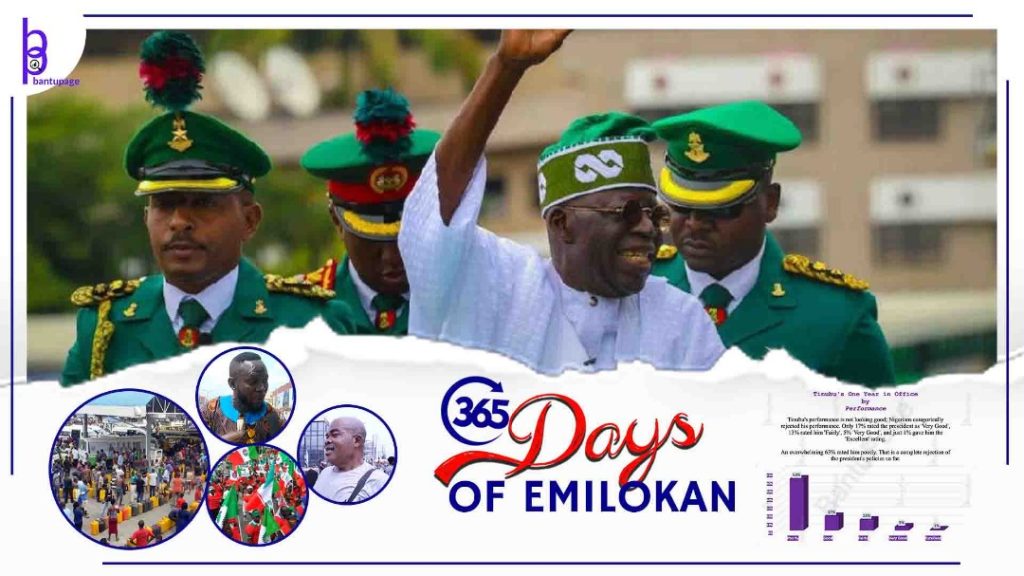
Tinubu Is One Year Old in Aso Rock
365 Days of Emi Lokan
Inflation in Nigeria is 33.69%, and the interest rate is 24.75%. Inflation is rapidly approaching 40%, and the number of poor people has almost increased fourfold. The naira has more than halved in value, wiping off savings. No people can live like this, and no country can survive with such rates. Nigerians are the most resilient people in the world.
The impact of Nigeria’s economic situation is severe. With double-digit inflation and interest rates, productivity, FDI, and the interaction between consumers and businesses have all significantly slowed down. This has led to a drastic shift in Nigeria’s economic standing, from being the largest economy in Africa in 2023, at $500 billion, to the fourth, with just over $200 billion in 2024. As a result, economic productivity is suffering, leading to a decline in Nigeria’s economic health. The skyrocketing cost of locally made products due to high inflation and interest rates is a clear indicator of the severity of the situation.
The APC’s rule over Nigeria will be remembered as the worst nightmare in Nigeria’s short lifespan; unless Tinubu replicates what his supporters alleged he did for Lagos, he will go down in history as the worst president, even ahead of Buhari.
Our respondents were asked who they would vote for if an election were held that day. Their response contradicted their disapproval of the president. Although 51% said they were not interested in voting for any leading politicians or past presidents, 20% said they would vote for Tinubu, which was ahead of Buhari, Obi, Jonatha, Atiku, and others. The president still packs a lot of support.

We asked respondents to rate Tinubu’s first year in office. 63% rated him poorly, 17% rated him good, 13% rated him fairly, 5% rated him very good, and just 1% rated him excellent. If you were to combine ‘good’, ‘fairly’, ‘very good’, and ‘excellent’, the president would have a 36% approval rating. That is higher than many Western leaders. Given the unpopular reforms he has implemented and the inevitable dissatisfaction among Nigerians, the president and his supporters could consider this a positive development. If those reforms he claimed were long-term beneficial and started yielding positive results, the president’s chance of reelection would seem likely.
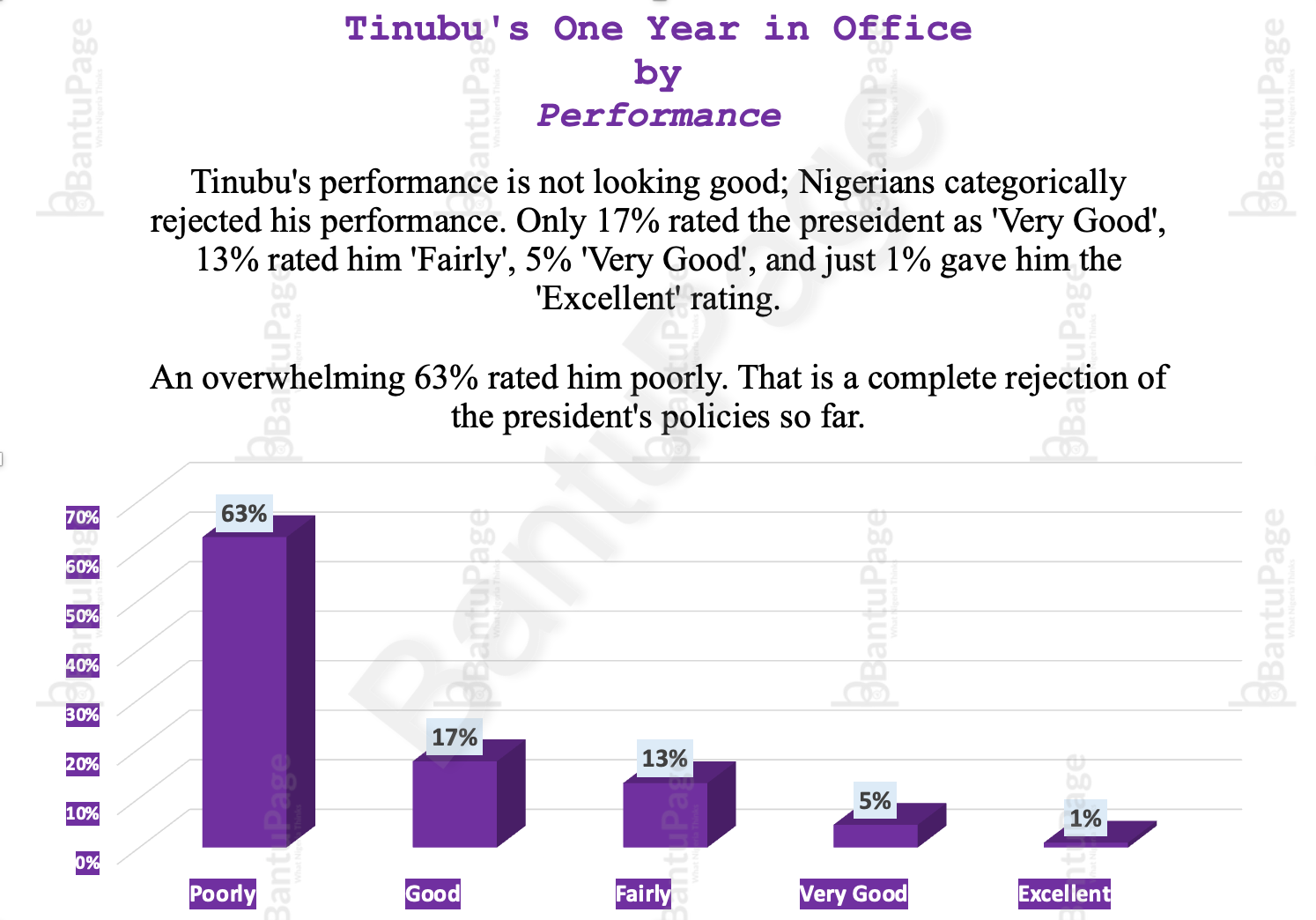
When asked to compare the situation now and before, the message was clear. 92% considered the situation now to be worse vs. 5%, 2%, and 1%, who respectively said the situation was better, had no opinion, and were the same. Despite their sentiments, why did 20% of them insist on reelecting the president in the event of an election on the same day as the poll? The answer is simple. Because person A disagrees with an aspect of person B, it does not mean that they disapprove of person B entirely.
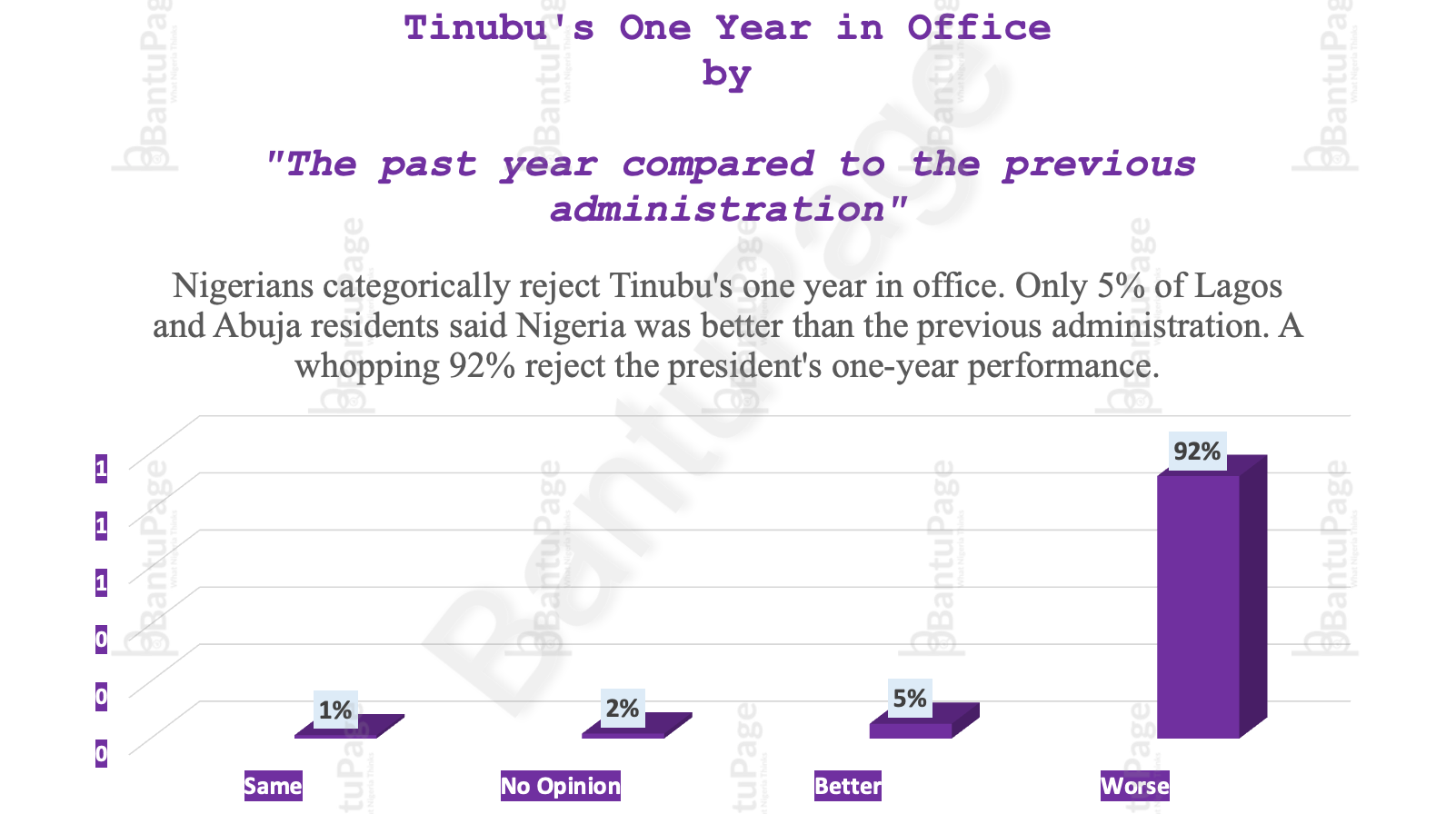
Abuja residents, 61%, disapprove of the president’s one-year performance. One would expect Yoruba-dominated Lagos to have a lesser disapproval rating. However, the president had a higher disapproval rating in Lagos than in Abuja, at 65%. However, when respondents are aligned by ethnicity, the never-ending Nigerian ethnic-centred political landscape comes calling.
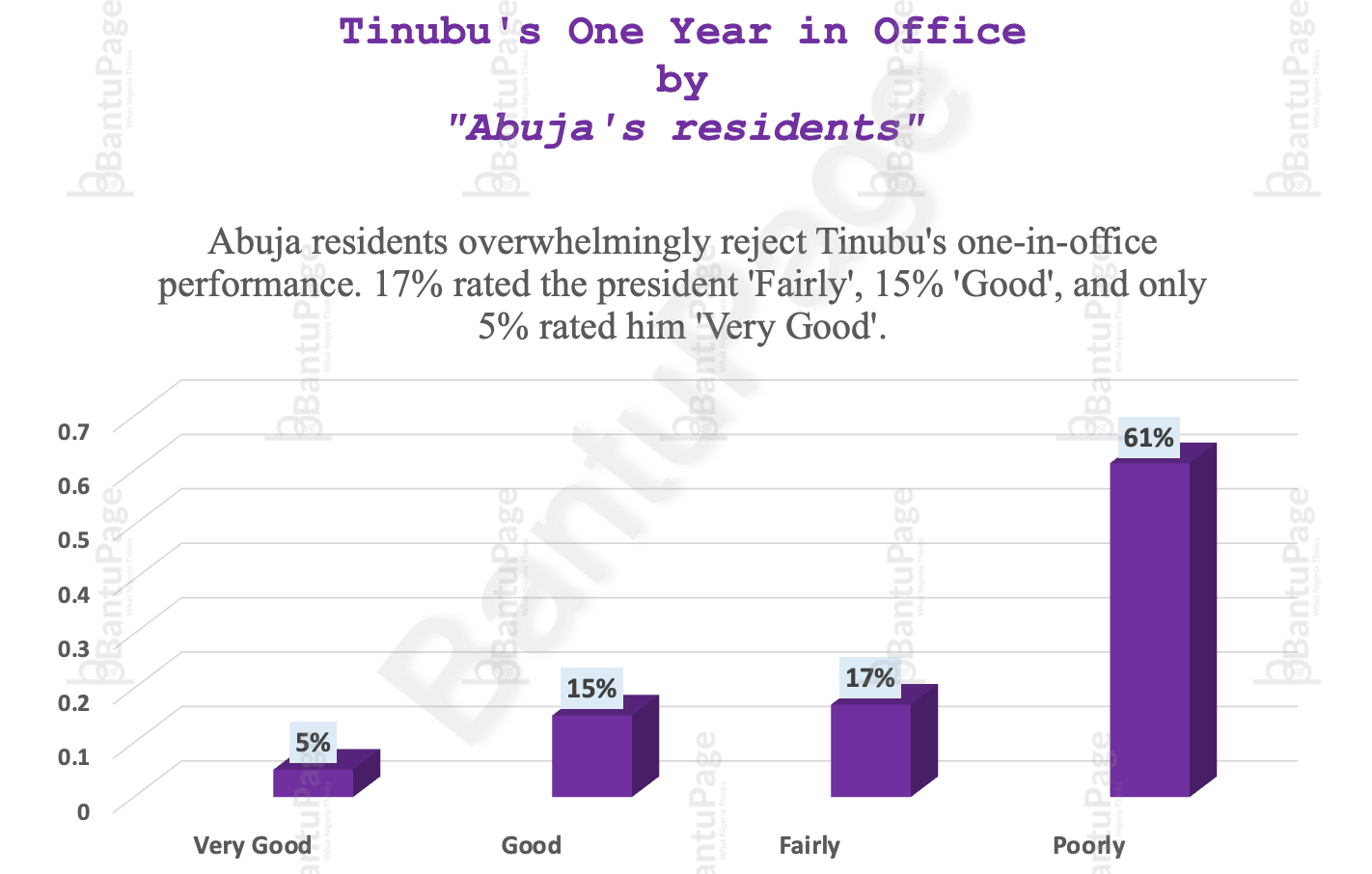
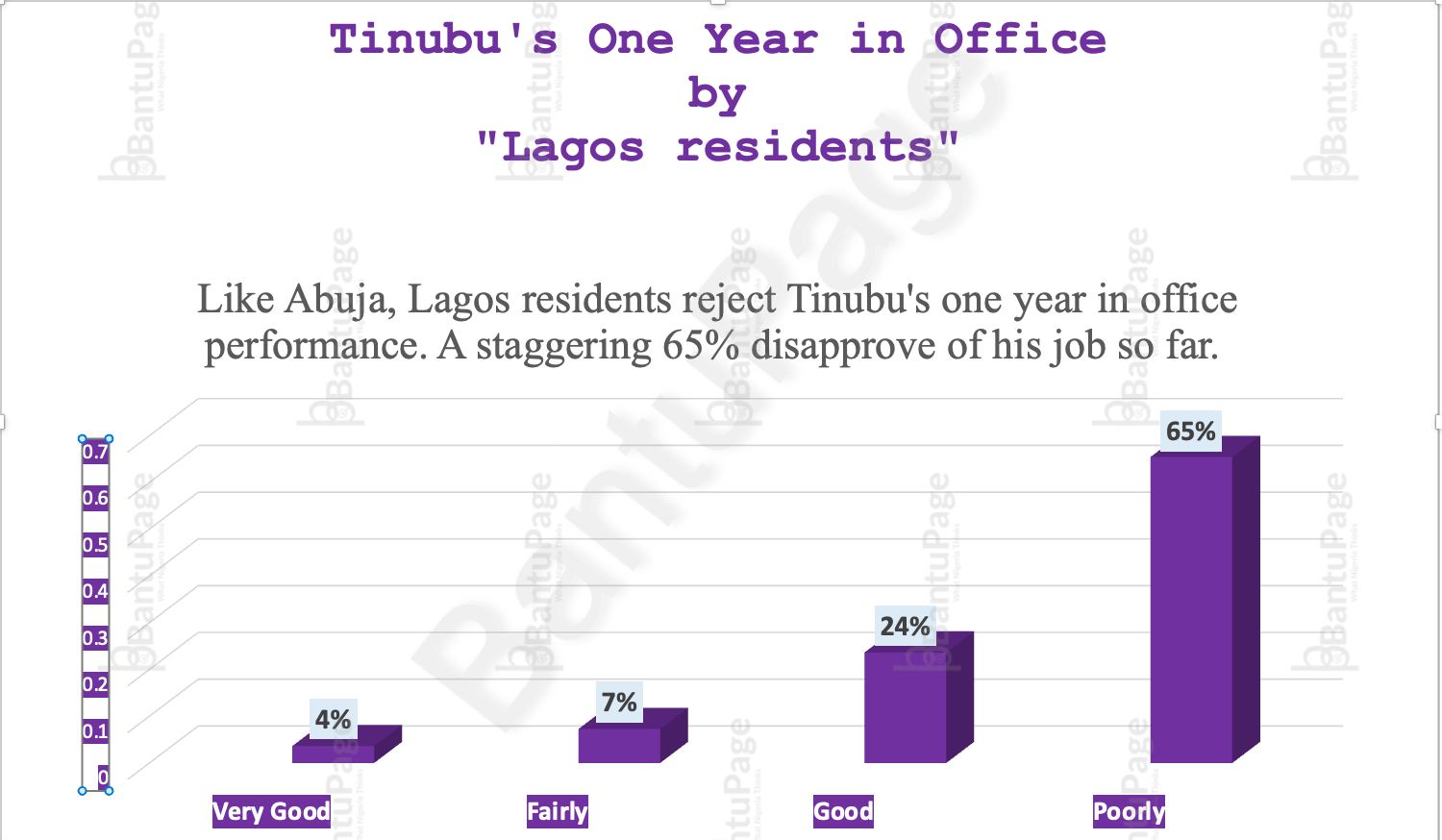
43% of Yoruba disapprove of the president’s performance, while 33%, 18%, and 6%, respectively, gave him a good, fair, and very good rating. Combined, 57% of Yoruba would express approval for the president’s performance.
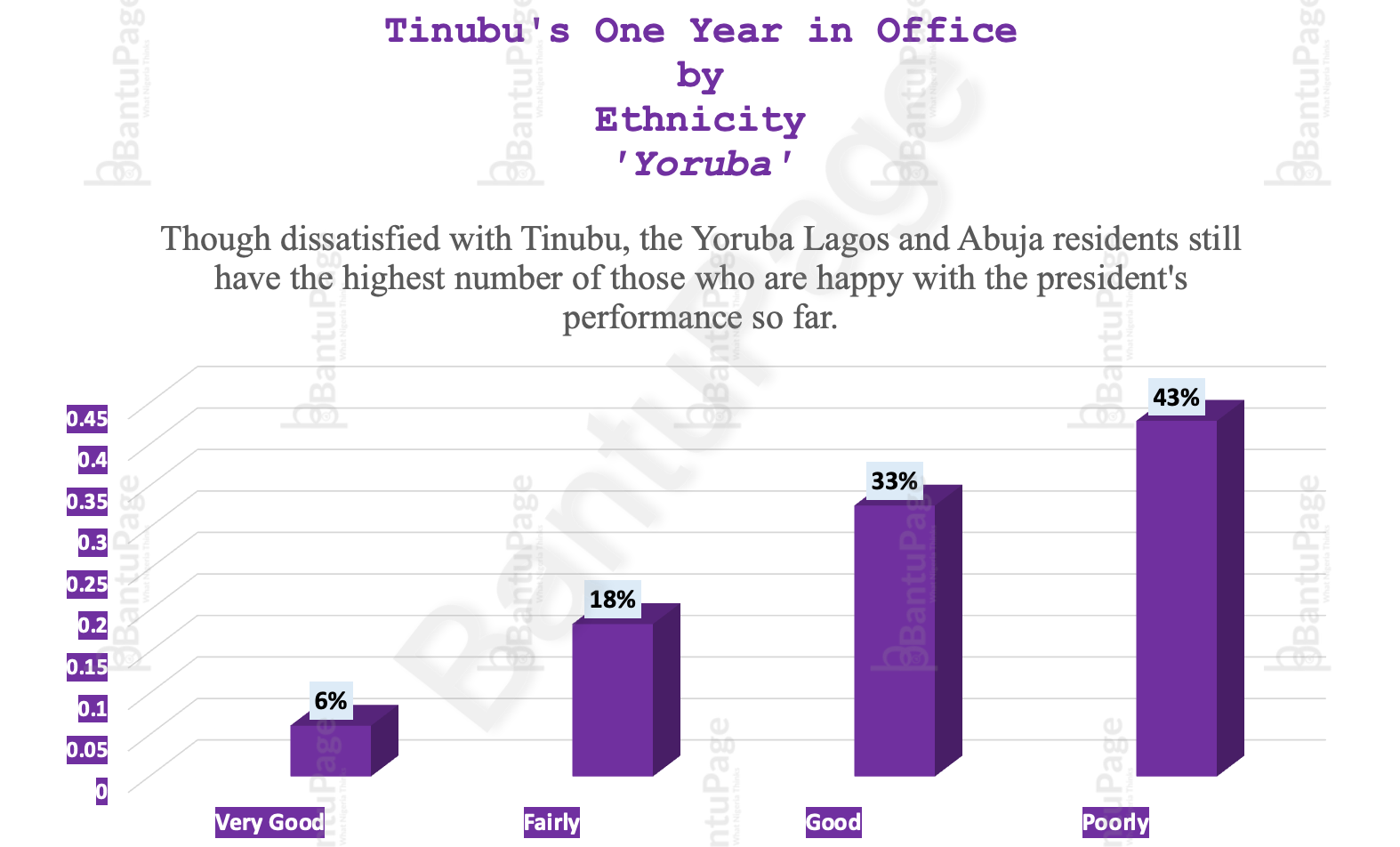
66% of Hausa disapproved of the president’s performance, while 15%, 7%, 7%, and 2% gave it good, fair, very good, and excellent, respectively. Again, 31% of Hausa would approve of the president’s performance if those were combined.
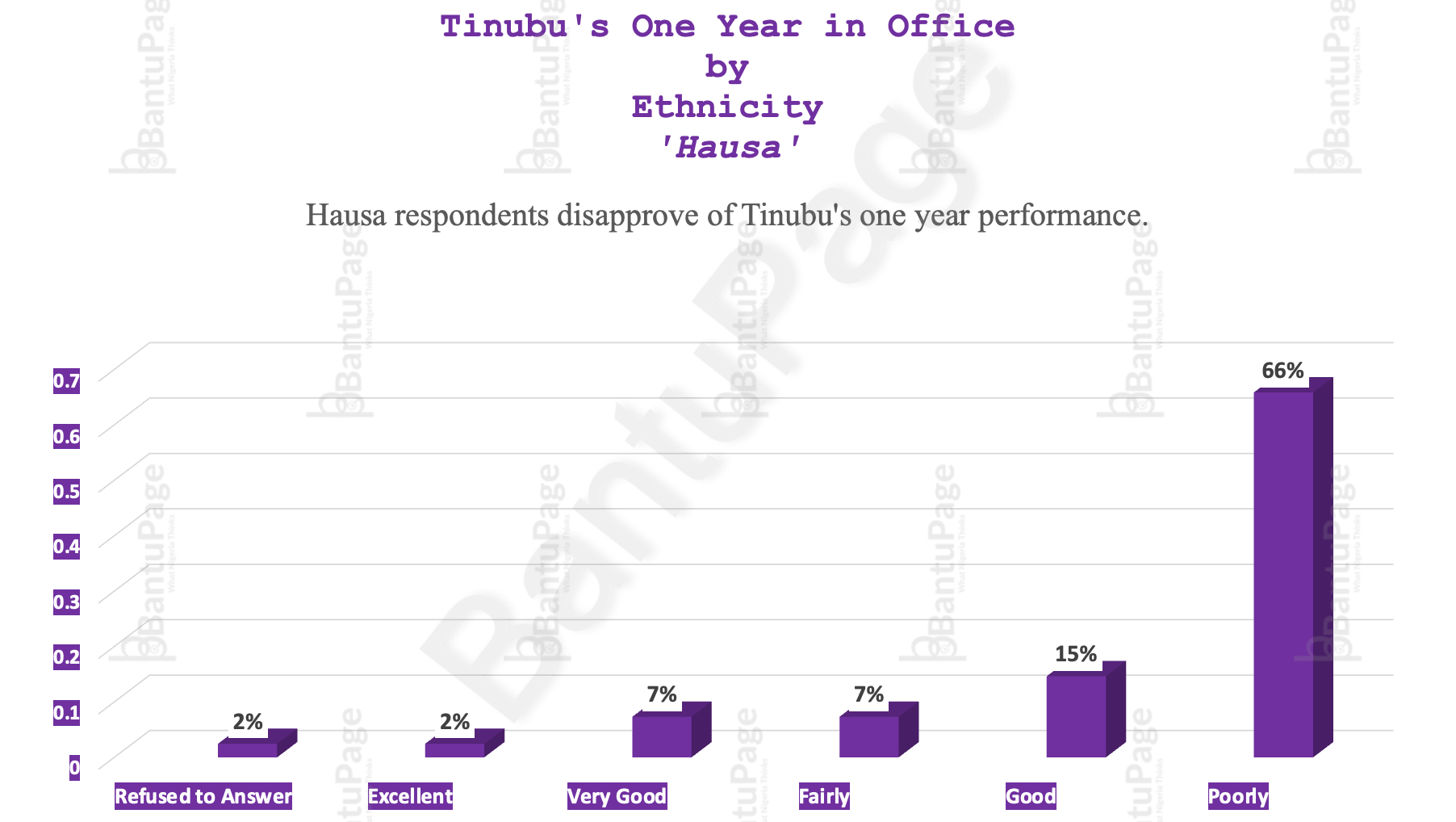
The Igbo, on the other hand, categorically disapproved of the president’s performance. A whopping 84% disapproved of him, while 10%, 4%, and 2% rated the president good, fair, and very good, respectively. Combining those ratings, the Igbo would approve of the president by 16%.
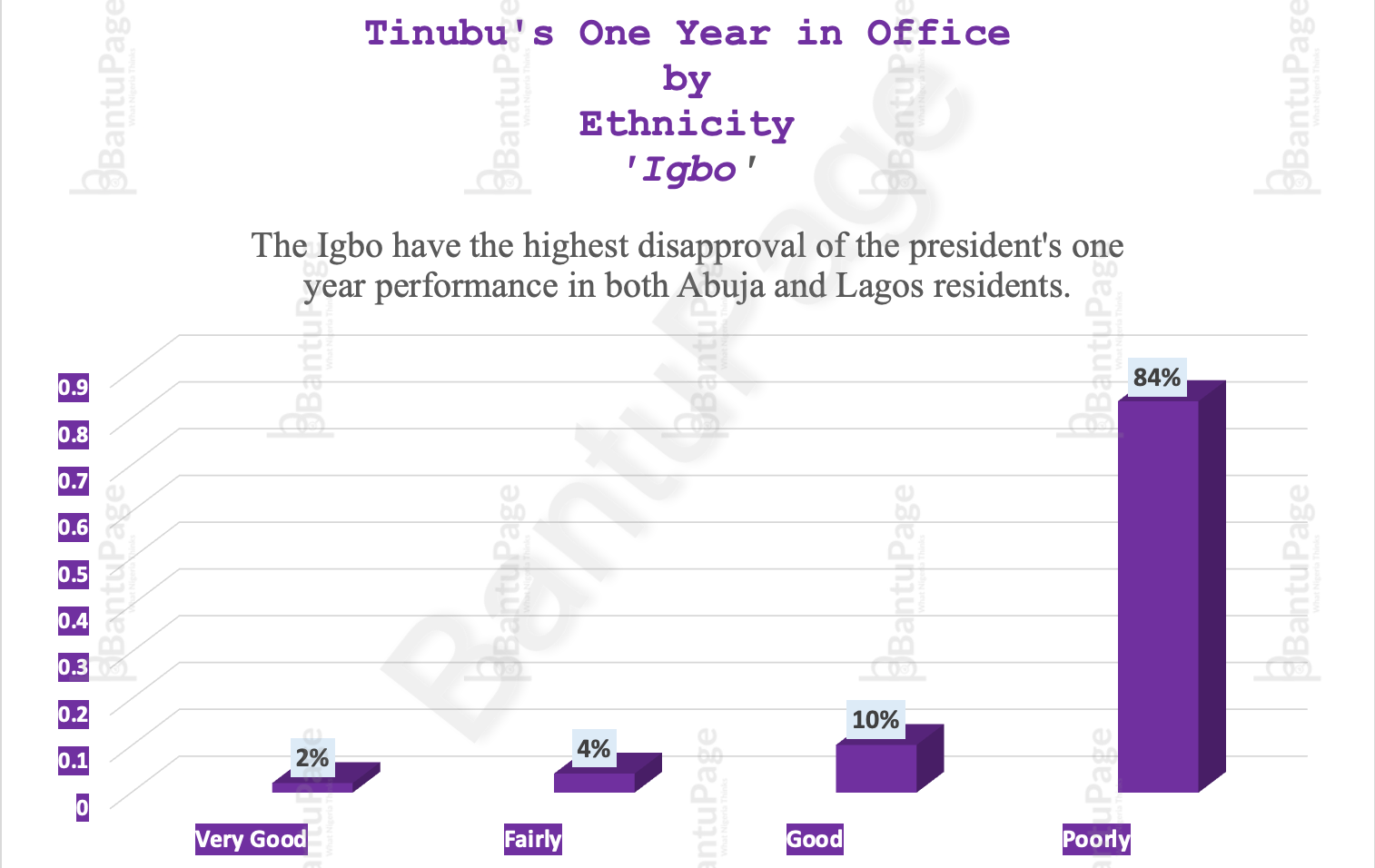
Who would have thought that a time would come when Nigerians would pick Buhari or Tinubu? We asked the respondents to choose between Buhari and Tinubu. They chose Buhari over Tinubu more than twice as often. 38% said they would vote for Buhari, while 18% picked Tinubu. Should an election take place on the poll day, Buhari would secure a landslide victory. That was not all; 44% refused to pick either, which was still a sizeable margin. BantuPage’s perception of the data was clear: Nigerians are not fond of either, but given the choice, Buhari would win.
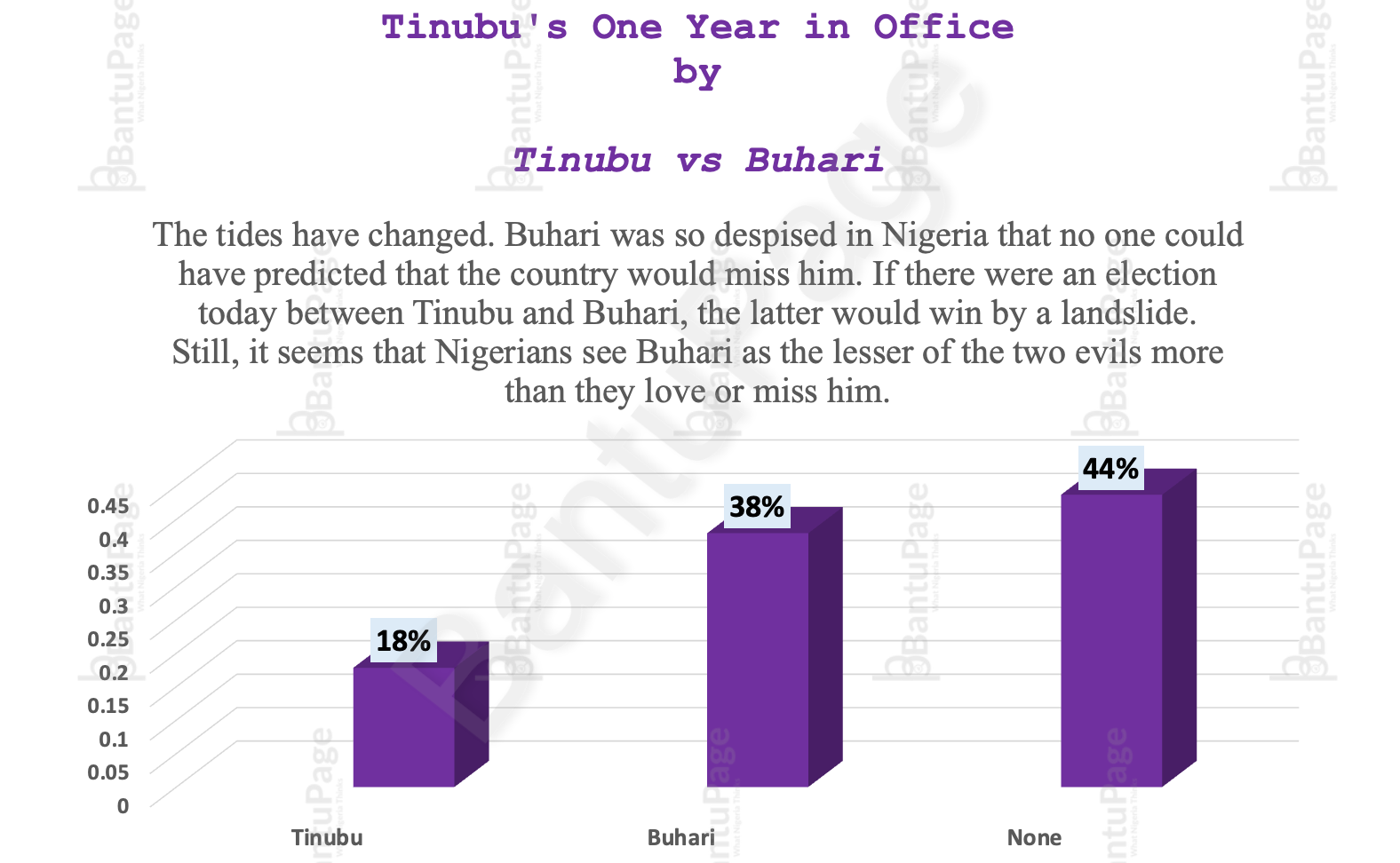
The below combined chart of Hausa, Yoruba, and Igbo says it all.
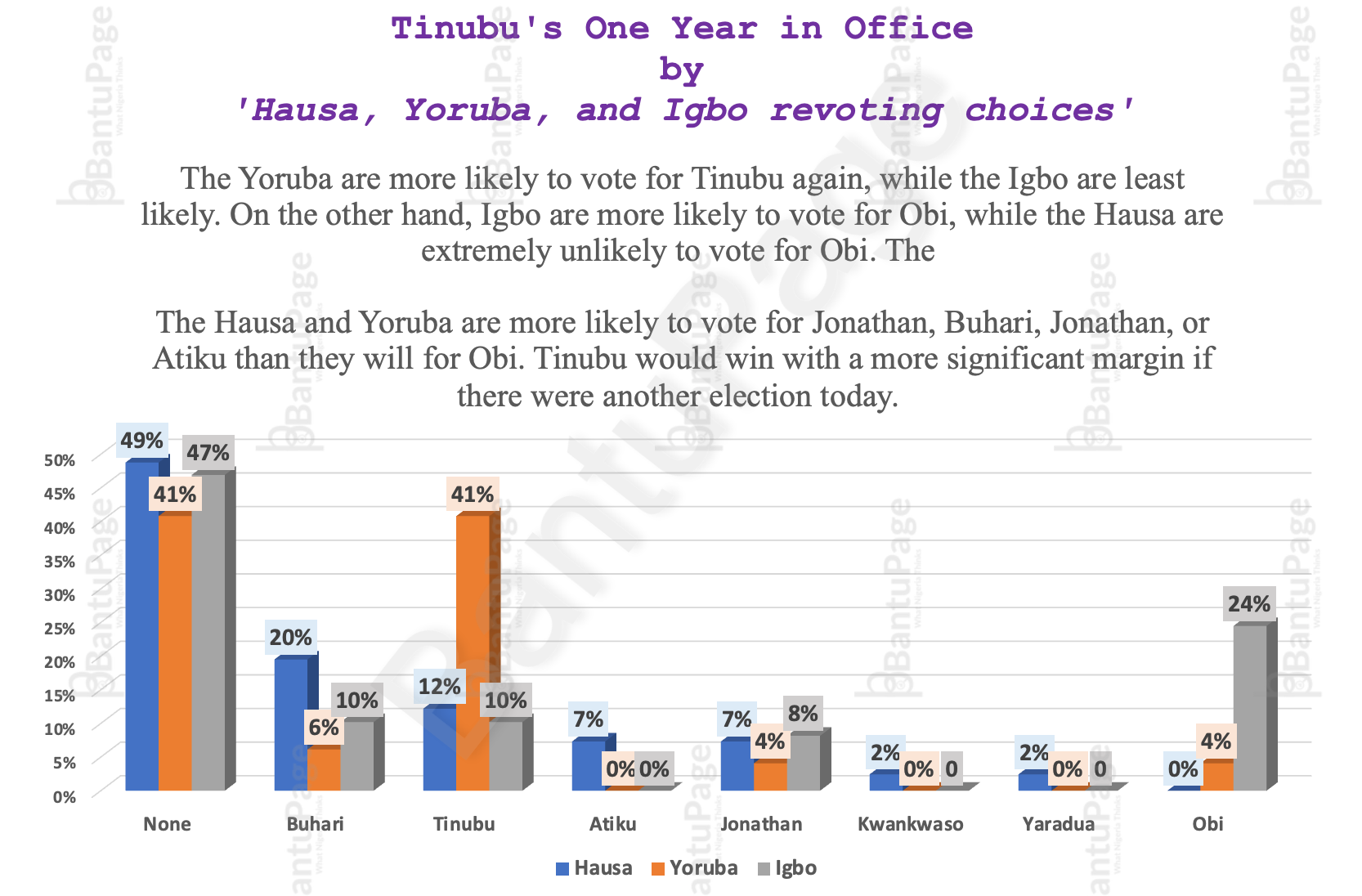
As the chart below clearly shows, ethnicity plays a massive role in our voting. We are a country of ethnic identity first, before the national one. When will Nigerians see past their ethnicity? Is there something wrong with our educational system? What can we do to eradicate ethnocentrism? For Nigeria to truly become a nation, we must resolve these questions.
President Tinubu’s Policies and Reforms
Removal of fuel subsidies
President Tinubu abolished the fuel subsidy, which had been a source of corruption, inefficiency, and fiscal burden for decades. However, Tinubu’s clumsy announcement of the removal sent petrol prices skyrocketing from N185 per litre to over N600. As of the first half of 2023, payment for the fuel subsidy was about N3.3 trillion. What has the government done with the fuel subsidy savings, and how much have they saved? No one knows.
Signing of the electricity bill into law
Tinubu passed the electricity bill, which authorises states, companies, and individuals to generate, transmit, and distribute electricity. The new electricity law repealed the Electric Power Sector Reform Act (EPSRA), signed by President Olusegun Obasanjo in 2005. The EPSRA (2005) provided the legal, regulatory, and governance frameworks underpinning the Nigerian Electricity Supply Industry (NESI). The new Act provides a framework for improving access to electricity in rural, unserved, underserved, peri-urban, and urban areas through conventional sources and renewable energy off-grid and mini-grid solutions.
Despite the elaborate language and signatures on the paper, Nigerians are hungry and lack the infrastructure to enact the kinds of laws Tinubu, and his government are busy penning in Aso Rock.
Student loan bill into law and Data Act protection law
Tinubu signed the student loan bill into law in June 2023, but its implementation is still underway. On June 14, 2023, President Tinubu signed the Nigeria Data Protection Bill 2023 into law. The legislation establishes a legal framework for safeguarding personal information and promoting data protection practices in Nigeria.
Tax and fiscal reform
Tinubu’s government established a Tax and Fiscal Reforms Committee that is entirely dedicated to deepening the ongoing reforms and repositioning the national economy for long-term sustainability.
Future investments
Tinubu has secured more than $20 billion in potential investments in the country, including $14 billion from India, $250 million from the Netherlands, and $500 million for lithium development in Nasarawa State, as well as another $500 million from Germany and into renewables.
Unification of the naira
In a significant policy shift, President Tinubu announced his government’s decision to unify the exchange rate, replacing the previous multiple exchange rate regime implemented by the Central Bank of Nigeria (CBN) during the administration of former President Buhari.
There is no doubt that President Tinubu is attempting to fix Nigeria. It is also right to say that President Tinubu’s attempt at reforming Nigeria is failing. Arguably, President Tinubu’s administration may not have the right skills to tackle Nigeria’s endemic problems. Furthermore, the president may have appointed individuals with questionable backgrounds to key policy-making positions within the country. It took a lot of giving to get to the presidency, and the president is trying very hard to appease those who gave him some of that leeway to sit at the top of the echelon. Nigerians are not for sale.
We have the worst infrastructure of any country as large as Nigeria. We have the poorest people in Africa. Our GDP has collapsed, people’s savings have turned to paper, and productivity has sunken. This happened faster under Tinubu’s one-year rule than at any time in Nigeria’s history. This is not the type of legacy anyone would want to leave for their country. As we brace for Tinubu’s second year, should we hope for the better? Without the foundations in place, hope is hopeless. Do you think that Nigerians have reasons to hope under Tinubu’s administration?
By Ikechukwu ORJI





